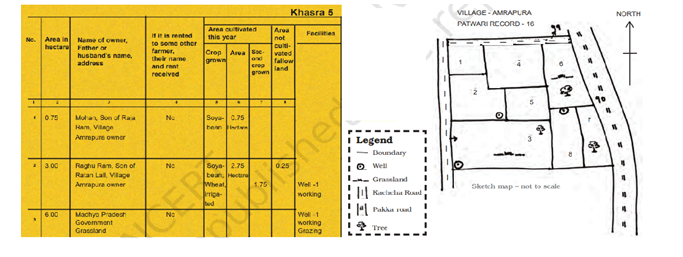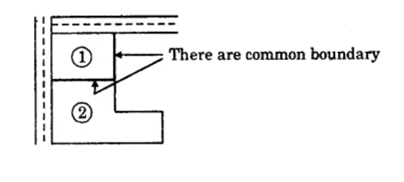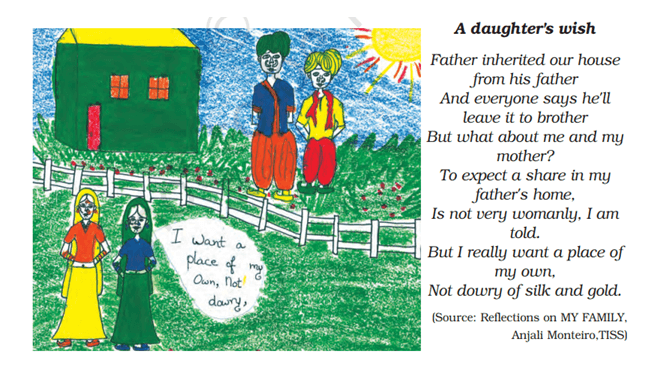Civics - Class 6
Our Past - I
Chapter 6: Rural Administration
Intext Questions:
Question 1. If there is a theft in your him see which police Station would you go to register your complaint?
Answer:If there is a theft in the house we can go and register the case only in the police station which comes in the area of work.
Question 2. What was the dispute between Mohan and Raghu?
Answer:Mohan and Raghu had adjacent plots of land, which were separated by a small boundary, one morning Mohan noticed that Raghu had shifted the boundary wall by a few feet and had managed to take over some of Mohan’s land and increased the size of his own land.
Question 3. Why Was Mohan worried about picking a quarrel with Raghu?
Answer:Raghu was an owner of several plots of land in the village and his uncle was also Sarpanch of said village. These were the reasons due to which Mohan worried to pick up a quarrel with Raghu.
Question 4. Some people said Mohan should report the matter to the police and others said he should not. What were the arguments they gave?
Answer:Some of the villagers were doubtful if this was a good idea to report the matter to the police. They felt they would waste lots of money and nothing would come out of it. They also said that Raghu’s family would have already contacted the police station After much discussion it was decided that Mohan would go to the police station along with some of the neighbours who had seen the incident.
Question 5. Show the above situation in the police station through a skit. Then talk about how you felt playing Mohan’s role, or that of the SHO or the neighbor. Could the SHO have handled the situation differently?
Answer: The scene starts at the Police Station when Mohan enters the Police Station and goes to the person in charge (SHO).
Mohan: I have a case to register. (He makes a request the clothes were torn and covered with blood with folded hands.
SHO: (The behaviour was very rude.) I cannot waste my time on petty and writing minor complaints.
Mohan: It may be a petty case for you. For me, it is the question of my land which has been used by my neighbour Raghu. He shifted the boundary wall by a few feet. I have Patwari records as proof.
SHO: I do not believe in this story and patwari records.
Mohan: (was puzzled.) He called his neighbors into the office.
SHO: Who are they? Why have they come?
Mohan: (showed his injuries.)
Neighbours: (They spoke in chorus.) We have been the witness when Mohan was mercilessly beaten by Raghu’s men. We have given the first aid. If we had not intervened, Mohan’s life would have been in danger. They insisted that the case be registered.
SHO: (Reluctantly) Agreed to register the case and be promised to send a constable who would investigate the case.
Talk about Mohan’s role.
I was very angry and frightened when I went to Raghu’s house. Raghu was a large landowner and an influential person. When I made a complaint to Raghu, I was mercilessly beaten. We went to the police station, but, the SHO refused to register the case. Why? I don’t know. Has Raghu already informed him? We, who are poor, will get no justice. I was relieved when my neighbors intervened and the case was registered.SHO: I was filled with pity when I saw the condition of Mohan. I wanted to help him but I was threatened not to register the case. Reluctantly I had to register it. I was greatly relieved that I have done a good deed.
Neighbors: They had collectively supported Mohan and promised to be the witness in the case. It was through their collective effort that the case was registered.
Question 6. Could the SHO have handled the situation differently?
Answer:Yes, the SHO could have handled the situation differently. Instead of rebuking Mohan, the SHO could have given a patient hearing. He should have called the neighbors separately to know’ what had happened. His behavior was very rude.
Question 7. Find out the term used for the Patwari in your state.
Answer:The Patwari is known by different names in different states. In some villages, such officers are called Lekhpals, in other Kanungo or Karamchari or Village Officer.
Question 8. If you lived in a rural area, find out:
- How many villages do the Patwari of your area maintain land records of?
- How do people in the village contact the Patwari?
Answer:
- The Patwari maintains land records of several villages.
- Patwari is a person who keeps all land records and is responsible for the collection of land revenue. So, if a person wants to buy or sell land, a record is maintained by the Patwari. The farmers may change the crop grown or construct a well in the field. All these changes are kept in the record of the Patwari.
Question 9.

- Who owns the land south of Mohan’s field?
Answer:Raghu Ram owns the land south of Mohan’s field.
- Mark the common boundary between Mohan’s and Raghu’s lands.
Answer:

- Who can use field no.3?
Answer:Field no. 3 belongs to the Madhya Pradesh government and can only be used by the Madhya Pradesh government.
- What information can one get for field no. 2 and field no.3?
Answer:Field no. 2: The field belongs to Raghu Ram, son of Ratan Lai Village Amrapura. He is the owner of the land. The land is not rented, it is used by the owner himself. The area of the land is 2.75 hectares. The second crop is grown in an area of 1.75 hectares, an area not cultivated but left fallow is 0.25 hectares. There is a well in the field, which is -in a working condition.
Field no. 3: This plot of land belongs to the Madhya Pradesh government. The area of the plot is 6 hectares. It is a grassland. The land is not rented out. The land is used for grazing. Well is in working condition.
Question 10. Farmers often require a copy of their land’s record together with a map as shown in the previous illustration.They have a right to have this information. They may have to pay a small fee for this. However, this information is not easily made available le and farmers sometimes have to face any problems to get it.In some states, records are now being computerized and also kept at the Panchayat Office so that they are more easily available and regularly updated, When do you think farmers may require a copy of this record? Study the following situation and identify the cases in which these records would be necessary and why.
- A farmer Wants to buy a plot of land from another.
Answer:The farmer will be able to find the owner of the land, the size of the land, and whether it is rented out or not.
- A farmer wants to sell her produce to another.
Answer:The farmer will be able to find the owner of the land, the size of the land, and whether it is rented out or not.
- A farmer wants a loan from the bank to dig a well in his/her land.
Answer:When a person takes a loan from the bank, he/she has to mortgage his/her property with the bank, as security. For this, he/she has to show the records of his/her ownership and the size of the plot of land.
- A farmer wants to purchase fertilizers; for his field.
Answer:If the farmer wants to buy fertilizers for his land it will be a cash transaction or it will give on loan, for a few days?
- A farmer wants to divide his. property among his children.
Answer:When the farmer wants to divide his property among his children, he will give acopy of the record to each child. The children will have to get their property registered and the record will be proof of inheritance.
Question 11. List the public services in the village/area such as.: the milk society, the fair price shop, the band the police station, the agricultural society for seeds and fertilizer, the post office or sub-post office, the Anganwadi, the creche, government schools, health center or government hospital, etc. Collection information On three Public Services and discuss; with your teacher, a few improvements can be made in their functioning? One example has been worked out.
Answer:
| Public service | What did you notice about their work? | Area covered | What do they need to do in order to use facility | Problems faced by those managing the service | Problems faced by people | Improvements that can be made |
|---|---|---|---|---|---|---|
| Fair price shop(ration shop) | The shop was open. Three people came. They all had yellow cards. They bought sugar and rice. Kerosene was not available. | This shop covers two villages. | You need a ration card. This has to be made at the tehsil office. | There is not enough supply of kerosene. | Rice is of very bad quality. We never get kerosene. | Improve quality of rice. Make kerosene available. The fair price shop should open every day. |
| Health centre | There is a long queues of the patients, but only few doctors are available. | Three villages | The patients card which has the information about disease, the prescription, medicines and the duration for which medicines has to be taken. | The patients cannot describe their problem properly. | The mediciens are not available. | The rules should be strictly adhered by the staff. |
| Milk society | The people are distributing milk in the morning and evening. | One village | Carry money and a pot to carry milk. | There is no proper time for milk carrying van. | The people have to wait for a long time. | The milk van owner should be warned about the timings. |
Questions:
Question 1. What is the work of the police?
Answer:Work of the police:
- Maintenance of law and order.
- Investigation of a case or taking FIR.
- Protection of the public and their property.
- Maintenance of the public safety.
- Testifying truthfully in the court.
Question 2. List two things that the work of a Patwari includes.
Answer:Two things that the work of a Patwari includes:
- Main work is measuring of land and keeping land records.
- Collection of land revenue from farmers.
- Providing information to the government about the growth of the crops.
Question 3. What is the work of a tehsildar?
Answer:Work of the tehsildar:
- Hearing disputes related to lands.
- Supervising the work of the Patwaris.
- Ensuring that land records are properly kept.
- Ensuring proper collection of land revenue.
- Making sure that the farmers can easily obtain a copy of their record.
- Caste certificates for the students.
Question 4. What issue is the poem trying to raise? Do you think this is an important issue? Why?

Answer:The poem is trying to raise the issue of gender discrimination based on the inheritance of land by their father.
Yes, this is an important issue because:
- Daughters are denied of the share.
- Son may not look after their mother and sisters after getting share of the property.
- Raising this issue will ensure the security of the women.
Question 5. In what ways are the work of the Panchayat, which you read about in the previous chapter, and the work of the Patwari related to each other?
Answer:
- Panchayat often settles the small disputes of lands between locals and Patwari maintains the land records and land settle disputes.
- Panchayat levied local taxes and revenue while Patwari organises the collected revenues.
- Both Patwari and Panchayat need to cooperate with each other on the construction works over land area.
Question 6. Visit a police station and find out the work that the police have to do to prevent crime and maintain law and order in their area especially during festivals, public meetings etc.
Answer:Work done by the police to prevent crime and maintain law and order in their area especially during festivals, public meetings:
- They enquire about the amount of crowd to be gathered in their local areas.
- According to the crowd, they prepare for the proper management and policemen set up on the duty.
- They also spread awareness among public to be careful and maintain peace.
- They prepare for any emergency and ready to handle it.
- All local police station are always in contact with their head branch and cooperate with each other.
Question 7. Who is in charge of all the police stations in a district? Find out.
Answer:Superintendent of police (SP) is in charge of all the police stations in a district while the local police station is headed by Station House Officer (SHO).
Question 8. How do women benefit under the new law?
Answer:Benefits to women under new law:
- Earlier they were not entitled to their ancestor's property but now they are.
- It makes the women more independent and economically secure.
- This also empowers the women and they can leave peacefully within the society.
- They can also start their own work after acquiring their shares in the property.
- They will be not excused over the beneficial and economical decisions.
Question 9. In your neighbourhood are there women who own property? How did they acquire it?
Answer:Yes, in my neighbourhood many women own their property. Some acquire it from their ancestors or forefathers while some bought their property from their own income source.